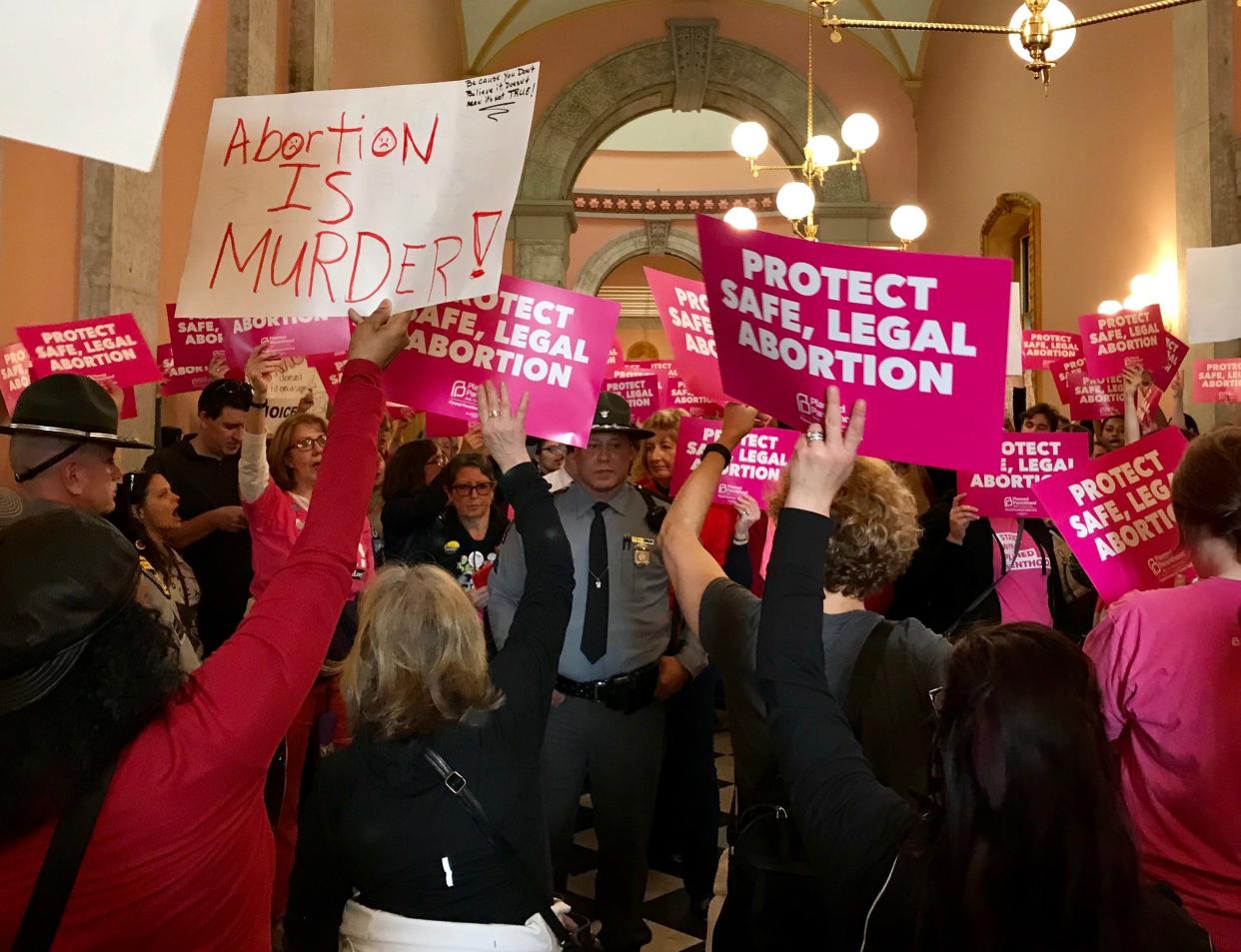Will Ohioans vote on abortion in 2023?

When the U.S. Supreme Court overturned Roe v. Wade last year, a swiftly implemented Ohio law cut off access to nearly all abortions.
Those abortion restrictions are now on hold and the law's fate is in the hands of Ohio judges. But proponents of abortion access in the Buckeye State want voters to decide when and how abortions are performed − as soon as this November.
“We’re absolutely 100% going forward this year," said Susan Shaw, spokeswoman for the Ohio Physicians for Reproductive Rights.
Two separate groups are working to enshrine abortion rights in the Ohio Constitution, and they have been collaborating. "We are working together on key aspects of the campaign and continue to make progress," Shaw said.
The two groups are:
Protect Choice Ohio, which is run by the Ohio Physicians for Reproductive Rights. The group was formed in August and is led by Dr. Marcela Azevedo and Dr. Lauren Beene, two Cleveland-area doctors. Ohio Physicians for Reproductive Rights has a political action committee and a 501(c)(4) nonprofit, according to its websites. These nonprofits are sometimes called dark money groups because donors are not disclosed.
Ohioans for Reproductive Freedom, which includes the American Civil Liberties Union of Ohio, Abortion Fund of Ohio, New Voices for Reproductive Justice, Ohio Women’s Alliance, Planned Parenthood Advocates of Ohio, Preterm-Cleveland, Pro-Choice Ohio and Unite for Reproductive & Gender Equity (URGE).
Ohio Physicians for Reproductive Rights wants to file ballot language this month with the Ohio Attorney General's Office to allow enough time to collect the required 413,446 signatures. Those signatures must be submitted by July 5 to make the November ballot.
The group's PAC raised $382,000 between September and the end of January, including donations from Abigail Wexner, philanthropist and wife of billionaire Les Wexner; "New Girl" sitcom creator Elizabeth Meriwether, former Jeni's CEO John Lowe, former Ohio Attorney General Marc Dann and dozens of physicians, according to campaign finance records.
Neither group wants to confuse voters by putting two versions of an abortion rights amendment on the November ballot.
“Of course, there are advantages to going to the ballot in 2023," said Kellie Copeland, executive director of Pro-Choice Ohio. "The most important being that if the Supreme Court of Ohio allows the six-week ban to go into effect, there would be a shorter window of time that Ohioans would be deprived of abortion care in their own communities.”
Abortion opponents are gearing up for a fight.
"We’re up for the challenge, and we believe we will be successful," said Ohio Right to Life President Mike Gonidakis, adding that they would soon announce a coalition of Ohio and national groups committed to fighting an abortion rights measure. "We will have the resources available to win guaranteed."
Aaron Baer, president of the Center for Christian Virtue, promised "an aggressive campaign to protect life and protect the heartbeat bill."
But Baer says that fight would be easier if Ohio lawmakers had asked voters to increase the threshold needed to pass a state constitutional amendment to 60%. Baer blames new Ohio House Speaker Jason Stephens for not holding a vote on the issue before the deadline to make the May ballot.
"The path forward to protect life was pretty straightforward," Baer said. "The stakes are incredibly high."
Stephens will have a new committee take a look at the proposal, although its fate in this General Assembly remains unclear.
More:'Victims of their own success': Records reveal deep rift in Ohio House Republican caucus
Where does Ohio abortion law stand?
Ohio's law banning most abortions is currently on hold through a court order, meaning doctors can perform abortions up to 20 weeks into pregnancy. Attorney General Dave Yost asked the Ohio Supreme Court to weigh in on the case, but the court has yet to decide if it will.
Ohio Senate President Matt Huffman, R-Lima, talked about tweaking the law during last year's lame-duck session to clarify when doctors could perform an abortion to save the mother's life. That never happened, but Gov. Mike DeWine said Wednesday that he thinks the Legislature should revisit that soon.
He also encouraged lawmakers to get ahead of the ballot initiatives.
"The legislature also needs to look at a very basic fact and that is in Ohio, we have an ability of people to take something to the ballot box for the people to vote on," DeWine said during an interview with Ohio editors and reporters from the USA TODAY Network. "I am pro-life, and I think saving lives is very, very, very important. We need a bill that we can pass...that is sustainable, and that will not be overturned by the voters when they go to the polls."
DeWine did not specify what that legislation would look like, only saying "we can disagree" about what would be in it. But he made clear what he doesn't want to see.
"I don't think we want to be in a situation − and I don't think most Ohioans want to be in a situation − where because voters didn't have a choice they wanted, we end up with a very liberal abortion (law)," DeWine said. "We're not California. We're not New York."
Jessie Balmert and Haley BeMiller are reporters for the USA TODAY Network Ohio Bureau, which serves the Akron Beacon Journal, Cincinnati Enquirer, Columbus Dispatch and 18 other affiliated news organizations across Ohio.
This article originally appeared on Cincinnati Enquirer: Ohio voters could see abortion issue on ballot in 2023

